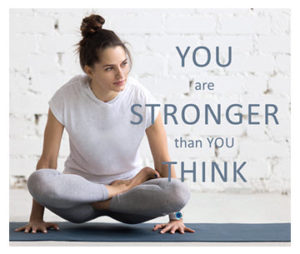You are stronger than you think, you are stronger than you think, you are stronger than you think… How many times have you whispered this mantra to yourself? Ah, the value of a well trained inner cheerleader!
 The need to constantly pump yourself up? I don’t know about you, but I’m over it, SO over it, beyond over it.
The need to constantly pump yourself up? I don’t know about you, but I’m over it, SO over it, beyond over it.
I wish I didn’t have to remind myself (daily?) that “I’m stronger than I think” as a way to gear up for old battles and new.
Personal battles. Professional battles. Political battles. Who knew?
Technology? That one crops up, too. Anyone care to join me in a love-hate relationship with technology’s benefits and its dreaded time suck?
And then there’s pain. Your very own Evil Empire. Pain gathering its troops at the base of your spine and fanning out in every direction… just because it can.
Yup, like millions of other Americans — lower back pain. Some estimates report that 80% of Americans suffer back pain. How crazy is that?
Now, I beat the worst of back pain once before and I’m determined to do it again, but its surprise attacks never fail to impress with their resilience. And thus, my secret weapon to reinforce resilience of my own: “You are stronger than you think.”
Women Are Strong… Blah, Blah, Blah!
We frequently tout the fact that women are strong. (I agree.)
We often serve up our tolerance, our forbearance, our ability to endlessly nurture others as signs of strength. (And they are, I agree.)
However, too often we tolerate too much, we are silent too long, and we manage our caretaking by dropping ourselves to last place on the list.
Bad call! Unsustainable position! Way to weaken the very strength we need to carry on!
Sure, theoretically, there is strength in patience; many of us, especially women, have been taught to exemplify “patience to endure.” Sure, there is wisdom in picking our battles. But acquiescence is not a strength. Fear can masquerade as tolerance. Habit can don the cloak of patience. Endless acceptance of mediocrity is not a positive state. There is a fine line when it comes to how much shit we should put up with!
Strong? Of course! We have to be. For many of our toughest choices we have only personal judgment to assess the pros, cons, risks, and rewards to guide us in deciding that enough is enough.
Picking Our Battles. Yes, But…
When I hear the expression “pick your battles,” I think of relationships. Romantic relationships, marriage, ex-spouses, kids. I also think of the routine dealings we have as working people dealing with our bosses, our teammates, our suppliers, and — the adage that the customer is always right aside — yes, those to whom we sell our products and services.
Picking your relationship battles is common sense, right? Every spousal infraction can’t possibly be of equal importance; leaving dishes in the sink or the toilet seat up is simply not as damning as secreting away money or flirting wildly with your neighbor over the backyard fence…
 In my experience, the ability to pick our battles assumes two constants: first, we can easily prioritize what is important, and second, the potential warfare is not a constant barrage.
In my experience, the ability to pick our battles assumes two constants: first, we can easily prioritize what is important, and second, the potential warfare is not a constant barrage.
Cue the current political environment. Cue my Reminders to Self to BREATHE. Cue the chaos, confusion, and cacophony of a constant barrage of real events of real importance in the real world.
And say hello to battle fatigue. More than fatigue, a profound, pervasive, and destabilizing anxiety.
When the Going Gets Tough
The saying goes: When the going gets tough, the tough get going. We’ve all been there, right? It’s motivational, yes? It’s a reminder that there are no “wins” without experiencing failure, everyone will stumble, and the measure of our character is in our ability to keep going, to “tough things out,” to persist — whether it’s physical pain or emotional pain or a numbing barrage of disappointments.
Unfortunately, when the going gets tough, the tough also get tired, cranky, suffer insomnia, develop ulcers, gain weight. The stress of prolonged battle takes its toll.
Now, that doesn’t mean we don’t persevere — the women and men I know who’ve been up against challenges are made of Very Strong Stuff. But everyone has their breaking point. There are only so many phone calls you can take concerning your 85-year-old mother’s outbursts before you begin to emotionally detach. There are only so many weeks at your child’s side as she goes through a crisis that you can bear, in need of a few hours to yourself, even if only to sit alone and weep. None of us is immune to bouts of despair, much less exhaustion.
So where do character and morality come into play? At what point — physical limitations not withstanding — do some of us tend to yield to other (higher? lower?) powers, as our friends, neighbors, and loved ones continue to fight the good fight? Are they made of stronger stuff, or do they rely on superior support systems?
Feeling Powerless? DO Something!
 How many defeats can anyone take, strong or not? At some point, won’t the body scream “enough” and likewise, the mind? Won’t we crumble — for an afternoon, a night, a week, a month?
How many defeats can anyone take, strong or not? At some point, won’t the body scream “enough” and likewise, the mind? Won’t we crumble — for an afternoon, a night, a week, a month?
I’ve always found powerlessness to be excruciating, or rather, the sensation of powerlessness. Most parents at some time or another have found themselves in some version of a powerless situation, and we truly cannot effect change on an outcome.
Yet for many of the painful realities we face in contemporary culture, even the most significant challenges like lost jobs, marital breakups, prolonged health issues, lost faith in ourselves — we can do something. We can’t fight on every front and it’s harder to fight when we’re doing it solo, but we are indeed stronger than we think, and action — some kind of positive action — is precisely the way we remind ourselves of that.
Action Sure Beats the Alternative
Maybe the action you take is emailing Congress two days a week and calling once a week on your highest issues of concern — environmental issues, for example.
Maybe it’s looking for a Facebook group to help generate money-making ideas — midlife or “third chapter” entrepreneurs seeking to band together and build new ventures.
Maybe it’s giving a dating app one more try…
Maybe it’s asking after your quieter neighbors to see if they need help in some way — picking up groceries, reading to a child, sitting and listening to their problems, which may make yours more manageable as a result. Helping others is a way to reinforce our humanity, our competence, our self-worth.
Inertia is a killer, a depressant, an insidious actor in transforming stagnation into “normalcy.” It obliterates agency. And agency is what adulthood is all about.
This doesn’t mean we won’t run down. This doesn’t mean we won’t need breaks. This doesn’t mean we won’t lose heart. But it does require that we exercise our adulthood, that we find support, and that we remember, whatever our other beliefs, our motivations, and the fights we face: We are stronger than we think.
You May Also Enjoy
This left me hungry for more about this. Unsatisfying to come back to you’re stronger than you think.
Having a female leader to look up to and emulate would be a nice Part 2 to this piece. Because w/o that women are back to putting themselves last putting their opinions last and not being raging successes w/o being b*tches. Which is the model I need and speaking to other women I hear other women need. I don’t want to be a man. I don’t want to be a forgiving squashed woman either. Need a new role model.
Quite right, Susan.
I would only qualify this by saying that when you are just trying to hang on, looking for any means to get through the day and address the bare necessities, looking beyond the immediacy of paying a bill or getting a child fed strains every fiber of hopefulness, much less exploration of the future.
That said, I agree with you completely. We need as many strong female role models as possible, in every conceivable realm.
Who are your role models? Are there no women you can look to in political, organizational, scientific, creative or other domains to inspire you?
You might find this post on women and leadership of interest.